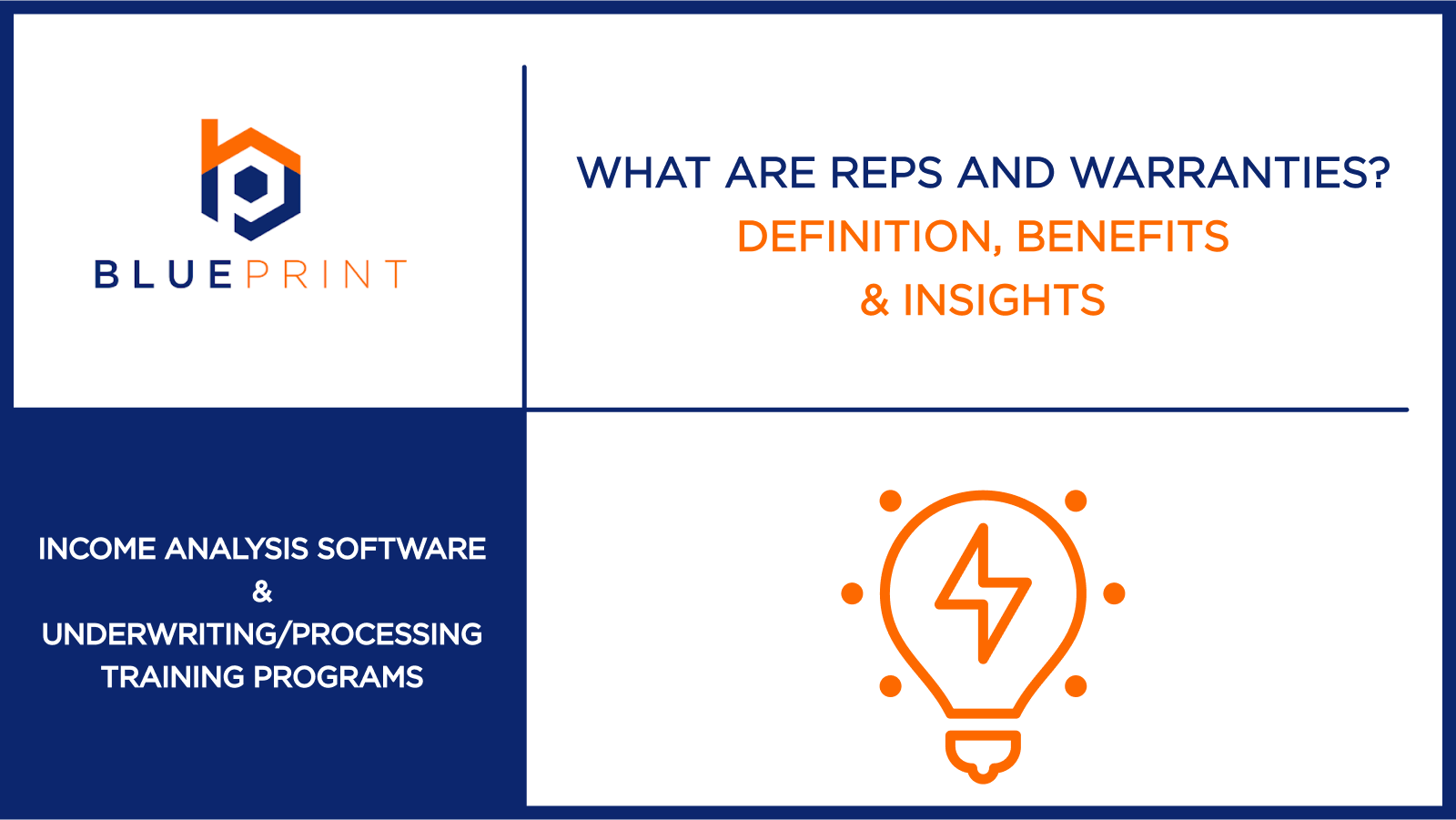Business agreements can cover a wide range of transactions—from real estate deals to corporate mergers. In every case, the parties involved seek assurances that the information they rely on is accurate and reliable. This is where representations and warranties come into play.
These legal statements form the foundation of trust in a contract by confirming that certain facts are true at the time of the agreement. While reps and warranties are used across many industries, this article explores their definition, benefits, and practical applications—with a closer look at how they support compliance and risk management in lending through tools like IncomeXpert.
Main takeaways from this article:
- Reps and warranties are critical in ensuring the accuracy of a sale and purchase agreement and reducing risk in business transactions.
- They play a key role in protecting against post-transaction financial loss, enhancing transparency, and ensuring legal compliance.
- These assurances are prevalent across various industries, such as real estate, mergers, acquisitions, and lending.
- Tools like IncomeXpert help in maintaining compliance and mitigating risks in the lending sector.
What are reps and warranties?

Reps and warranties, short for “representations and warranties,” are formal statements made by one party to another in a purchase and sale agreement about the accuracy and validity of disclosed information and the fulfillment of specific obligations. These statements provide a legal framework that serves two key functions: providing assurances to all parties involved in a transaction and acting as an essential risk management tool.
Representations
These are assertions of fact regarding a topic relevant to the transaction. They may include, for example, claims regarding financial statements, legal title to assets, or the absence of certain liabilities. Representations are crucial for building trust and ensuring all parties are operating on a common understanding.
Warranties
Warranties, on the other hand, are guarantees regarding specific facts, typically providing a promise that the information represented is true. If a warranty proves to be false, the aggrieved party may have recourse to remedies such as damages or contract termination.
Examples of reps and warranties in contracts
You can come across many different types of contracts that include reps and warranties, such as agreements for mergers or acquisitions, loan contracts, and transactions involving real estate. Here are some common examples:
Mergers and acquisitions (M&A) agreements
- Intellectual property: The seller represents that they own or have the right to use all intellectual property necessary to operate the business and that there are no pending or threatened intellectual property disputes.
- Employee benefits: The seller represents and warrants that all employee benefits are in compliance with applicable laws and that there are no undisclosed liabilities related to these plans. This can drastically change a company’s purchase price.
Real Estate Contracts
- Ownership and title: The seller represents and warrants that they have clear and marketable title to the property and have the legal right to sell it.
- Zoning and permits: The seller may represent and warrant that the property complies with all applicable zoning regulations and that all necessary permits have been obtained.
Loan Contracts
- Income and employment: The lender represents and warrants that the borrower’s income and employment information have been accurately verified and documented in accordance with applicable guidelines.
- Collateral ownership: The lender represents and warrants that the borrower holds clear title to any pledged collateral and that the property is free of undisclosed liens or encumbrances.
Why are reps and warranties important?

Reps and warranties ensure that business transactions proceed smoothly while minimizing potential risks. Let’s explore in detail why these statements are indispensable in business dealings.
Mitigating financial loss
By ensuring that parties make truthful representations about their obligations and assets, reps and warranties reduce the risk of unforeseen liabilities that could arise after a transaction closes. For instance, if a seller misrepresents the condition of an asset or fails to disclose relevant liabilities, the buyer may face unexpected expenses that could lead to substantial financial losses.
Ensuring legal protection and due diligence
Reps and warranties play an important role in the legal due diligence process by providing recourse if one party doesn’t comply with their agreement. Legal protection is particularly important in complicated transactions like mergers and acquisitions, where inaccurate information can lead to severe consequences.
Enhancing transparency in transactions
The inclusion of reps and warranties ensures that all parties involved in the transaction operate with a mutual understanding of the key conditions impacting the agreement. Promoting transparency helps build mutual trust so the parties can openly represent their positions and minimize misunderstandings.
These clear agreements help prevent disputes from arising later, as any discrepancies in the agreements can be addressed before the transaction is finalized.
Maintaining regulatory compliance
Compliance with regulatory standards is a must in many industries. Reps and warranties help ensure compliance with legal requirements by affirming that parties adhere to relevant laws and regulations.
For example, in the real estate and lending sectors, stakeholders must operate within specified legal frameworks. By incorporating reps and warranties that affirm compliance, parties can reduce their exposure to regulatory penalties, lawsuits, or other consequences that arise from non-compliance.
How reps and warranties apply in different industries

Reps and warranties vary in their application across various industries based on the unique needs of each field.
Real estate transactions
In real estate, reps and warranties confirm the property’s condition and compliance with laws, offering buyers assurance on various aspects, from structural integrity to environmental regulations. These details, negotiated in agreements, enable informed decision-making and protect against unforeseen defects, ensuring both parties are transparent and obligations are clearly defined.
Mergers & acquisitions (M&A)
In merger and acquisition contracts, reps and warranties safeguard both the buyer and the seller. These provisions, including those relating to legal issues and pending litigation, help keep both parties informed about each other’s businesses. Such clarity can help balance power dynamics that naturally arise in the M&A context.
Parties may also consider reps and warranties insurance beyond the contractual reps and warranties themselves to further mitigate potential financial losses arising from breaches of representations.
Lending and mortgage industry
In the lending industry, reps and warranties play a critical role in loan origination and investor confidence. Lenders make representations about a borrower’s income, employment, and overall creditworthiness, and warrant that the loan meets all applicable guidelines. These assurances are essential for securing approval from agencies like Fannie Mae and Freddie Mac.
Key parts of a reps and warranties clause in lending

A thorough understanding of what constitutes a reps and warranties clause is key for lenders. Here are its critical components:
Statement of representation
In mortgage lending, the lender provides representations to the investor or agency stating that the loan was originated in accordance with applicable guidelines and that the borrower’s information has been properly verified. These statements typically include:
- That the borrower’s identity, income, and employment have been verified
- That financial documents such as tax returns and paystubs are complete and accurate
- That the borrower demonstrates the ability to repay the loan based on qualified income analysis
These representations are part of the lender’s legal assurances that the loan is sound and compliant with underwriting requirements. Tools like IncomeXpert help support these reps by standardizing income calculations and reducing the risk of manual errors.
Scope and materiality
This component defines the extent of the borrower’s representations and identifies which aspects of their financial condition are deemed material to the transaction.
The scope ensures that both parties understand the areas covered by the representations, preventing ambiguity. Materiality refers to the significance of the information itself; only those statements that significantly affect the transaction are typically included.
Survival period
The “Survival Period” specifies how long the representations and warranties remain valid after the closing date. This timeline is important because it defines how long that investor (e.g., Fannie Mae or Freddie Mac) can hold the lender accountable if a representation is later found to be inaccurate.
Typically, the survival period is negotiated based on the nature of the transaction and the level of risk involved. Once this period elapses, the investor may no longer have grounds to demand remedies, such as loan repurchase, for breaches tied to the original representations and warranties.
Limitations and exclusions
This section outlines any specific liabilities that are not covered by the reps and warranties clause. It may define circumstances where the lender cannot be held responsible—for example, in cases involving borrower fraud that could not reasonably have been detected during underwriting.
These limitations are important because they help clarify the boundaries of the lender’s liability and reduce the risk of unfair repurchase demands when issues fall outside the lender’s control.
Remedies and recourse
The “Remedies and Recourse” section details the actions that an investor or agency may take if the lender breaches its representations and warranties. Common remedies include:
- Requiring the lender to repurchase the defective loan
- Seeking financial compensation for losses tied to underwriting errors
- Triggering indemnification provisions if included in the agreement
- Demanding corrective actions or further documentation
Clear recourse terms ensure that both parties understand the consequences of a rep or warranty breach. For lenders, using tools like IncomeXpert helps minimize risk by reducing the likelihood of income-related defects and making it easier to defend the accuracy of underwriting decisions.
The risk of loan buybacks in lending
Loan buybacks occur when an investor or agency (such as Fannie Mae or Freddie Mac) requires a lender to repurchase a loan due to defects in the original underwriting—often related to inaccurate income calculations, missing documentation, or non-compliance with guidelines.
For lenders, buybacks can result in substantial financial losses, especially if the loan has already defaulted or been sold at a premium. They also create operational burdens, such as reprocessing the loan, absorbing credit risk, and facing potential reputational damage. Because income defects are one of the most common causes of loan repurchase demands, accurate verification is essential for protecting against this risk.
How reps and warranties impact loan approvals
Reps and warranties play a key role in how lenders document and justify loan approvals. These contractual assurances confirm that the borrower’s information—such as income, employment, and creditworthiness—has been accurately verified and complies with applicable agency or investor guidelines.
If a lender fails to properly validate this data, it can lead to significant financial losses and operational challenges, especially if the loan is later subject to a repurchase request.
Why accurate income calculations matter
Accurate income calculations help determine a borrower’s ability to repay a loan, forming a key part of underwriting decisions. Any inaccuracies or misrepresentations can affect the loan approval process, increase the risk of default, and lead to financial consequences for both the borrower and the lender.
For lenders, miscalculations can result in non-compliance with agency guidelines—raising the risk of loan defects and potential repurchase demands.
How IncomeXpert helps reduce risk
IncomeXpert is an automated solution designed for lenders to streamline income verification and calculation. Here’s how it simplifies the underwriting process to ensure accuracy and compliance:
Automates agency-compliant income calculations
IncomeXpert automates the complex process of income calculation, adhering to the specific guidelines of agencies like Fannie Mae and Freddie Mac. This standardization eliminates manual errors and ensures consistency across loan files, reducing the risk of non-compliance and subsequent buyback demands.
Flags self-employment income inconsistencies
Self-employment income can be particularly challenging to verify. IncomeXpert employs advanced algorithms to detect inconsistencies in self-employment documentation, such as discrepancies between tax returns and profit and loss statements. This helps underwriters identify potential red flags and mitigate the risk of fraud or misrepresentation.
Ensures income documentation compliance
Maintaining thorough and accurate income documentation is crucial for compliance. IncomeXpert ensures that all required documents are collected, verified, and stored in a secure and organized manner. This comprehensive documentation trail provides a strong defense against buyback demands and regulatory scrutiny.
Reduces underwriting errors and buyback risk
By automating income calculations and ensuring documentation compliance, IncomeXpert minimizes the potential for human error in the underwriting process. This reduction in errors directly translates to a lower risk of loan defects and subsequent buyback demands, protecting lenders from financial losses.
Achieve reps and warranties protection with IncomeXpert
Reps and warranties are fundamental components of business contracts that provide comprehensive protection and unparalleled transparency for all participants. By understanding their importance and implementing robust compliance solutions, your organization can greatly enhance operational effectiveness and minimize risk.
IncomeXpert offers a powerful solution that streamlines income verification, ensures compliance, and minimizes underwriting errors. By leveraging the platform’s advanced capabilities, lenders can strengthen their reps and warranties protection and mitigate the financial risks associated with loan buybacks.
To learn how IncomeXpert can safeguard your lending operations and minimize buyback risk, request a demo today.

